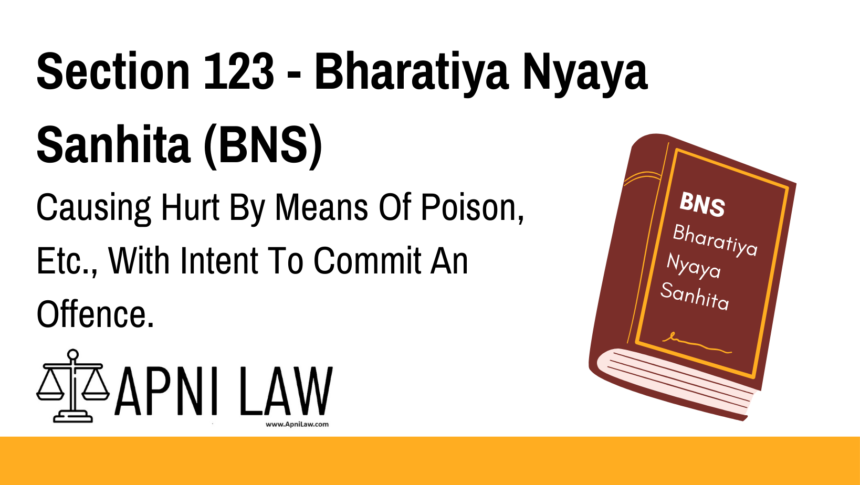Code: Section 123 BNS
Whoever administers to or causes to be taken by any person any poison or any
stupefying, intoxicating or unwholesome drug, or other thing with intent to cause hurt to
such person, or with intent to commit or to facilitate the commission of an offence or knowing
it to be likely that he will thereby cause hurt, shall be punished with imprisonment of either
description for a term which may extend to ten years, and shall also be liable to fine
Explanation of Section 123 BNS
Section 123 of the Bharatiya Nyaya Sanhita (BNS) criminalizes the administration of poison, intoxicants, or any harmful substances with the intent to cause harm or facilitate an offense.
This provision aims to penalize individuals who use harmful substances to incapacitate victims, often as a means to commit further crimes like theft, kidnapping, or sexual offenses.
Key Elements of Section 123 BNS:
- Acts Covered:
- Administering poison, stupefying substances, intoxicants, or unwholesome drugs to another person.
- Causing another person to take such substances.
- Intent Requirements:
- To cause hurt to the victim.
- To commit another offense (e.g., robbery, sexual assault, or kidnapping).
- Knowing that harm is likely to be caused by the act.
- Punishment:
- Imprisonment up to 10 years (rigorous or simple).
- Fine (amount discretionary as per case).
Illustrations
Example 1: Spiking a Drink for Theft
A criminal adds a sleeping pill to a stranger’s drink at a bar. Once the victim becomes unconscious, the criminal steals their wallet and phone. Since the intent was to facilitate theft, the perpetrator will be punished under Section 123 BNS.
Example 2: Poisoning for Revenge
A man, angry at his neighbor, secretly mixes a slow-acting poison into their food, intending to make them sick. Since this was done with intent to cause hurt, he can be convicted under Section 123 BNS.
Example 3: Drugging a Person for Assault
A person gives a woman an intoxicating drug in her drink without her knowledge, intending to sexually assault her. Here, Section 123 BNS applies for administering the drug, and additional charges under Section 77 BNS for the attempted offense may also be invoked.
Common Questions and Answers on Section 123 BNS
1. How is Section 123 BNS different from Section 122 BNS?
- Section 122 BNS (Read here) applies when hurt is caused due to sudden provocation.
- Section 123 BNS applies when poison or drugs are used to cause hurt or commit another offense.
2. What if the victim voluntarily takes the substance?
- If the victim was deceived into consuming the substance, Section 123 BNS applies.
- If a person knowingly consumes drugs or intoxicants, it does not fall under Section 123 BNS, unless someone forced or tricked them.
3. What are the commonly used substances in such crimes?
- Poisonous substances like arsenic or cyanide.
- Stupefying drugs like chloroform or sedatives.
- Intoxicants such as alcohol mixed with drugs.
- Unwholesome substances like harmful chemicals in food.
4. Can a person be jailed for just attempting to administer poison?
Yes, attempting to administer poison with intent to cause harm is punishable, even if the victim does not consume it.
5. What other sections may be applicable along with Section 123 BNS?
- Section 124 BNS – If the act results in grievous hurt (Read here).
- Section 77 BNS – If the act was done to commit a sexual offense.
- Section 298 BNS – If the act results in death, it can be tried as culpable homicide or murder.
Conclusion
Section 123 BNS strictly penalizes those who use poison, intoxicants, or drugs to harm others or facilitate crimes. This law is particularly relevant in cases of drink spiking, food poisoning, and drugging victims for robbery or assault.
For more legal insights and expert guidance, visit ApniLaw today! 🚀








